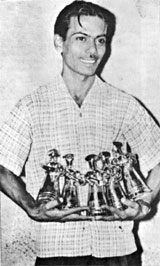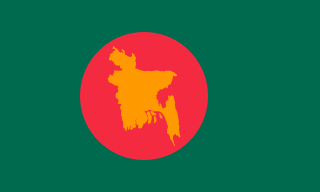Related Research Articles

Sheikh Mujibur Rahman, shortened as Sheikh Mujib or Mujib, was a Bangladeshi politician and statesman. He is called the "Father of the Nation" in Bangladesh. He served as the first President of Bangladesh and later as the Prime Minister of Bangladesh from 17 April 1971 until his assassination on 15 August 1975. He is considered to be the driving force behind the independence of Bangladesh. He is popularly dubbed with the title of "Bangabandhu" by the people of Bangladesh. He became a leading figure in and eventually the leader of the Awami League, founded in 1949 as an East Pakistan–based political party in Pakistan. Mujib is credited as an important figure in efforts to gain political autonomy for East Pakistan and later as the central figure behind the Bangladesh Liberation Movement and the Bangladesh Liberation War in 1971. Thus, he is regarded as "Jatir Janak" or "Jatir Pita" of Bangladesh. His daughter Sheikh Hasina is the current leader of the Awami League and also the Prime Minister of Bangladesh.

The Bangladesh Liberation War, also known as the Bangladesh War of Independence, or simply the Liberation War in Bangladesh, was a revolution and armed conflict sparked by the rise of the Bengali nationalist and self-determination movement in what was then East Pakistan during the 1971 Bangladesh genocide. It resulted in the independence of the People's Republic of Bangladesh. The war began after the Pakistani military junta based in West Pakistan launched Operation Searchlight against the people of East Pakistan on the night of 25 March 1971. It pursued the systematic elimination of nationalist Bengali civilians, students, intelligentsia, religious minorities and armed personnel. The junta annulled the results of the 1970 elections and arrested Prime minister-designate Sheikh Mujibur Rahman. The war ended on 16 December 1971 after West Pakistan surrendered.

Ghulam Azam was a Bangladeshi Islamist politician and the former leader of Bangladesh Jamaat-e-Islami, the largest Islamist political party in Bangladesh.

Zahir Raihan was a Bangladeshi novelist, writer and filmmaker. He is most notable for his documentary Stop Genocide (1971), made during the Bangladesh Liberation War. He was posthumously awarded Ekushey Padak in 1977 and Independence Day Award in 1992 by the Government of Bangladesh.
The Bangladesh Liberation War started on 26 March 1971 and ended on 16 December 1971. Some of the major events of the war are listed in the timeline below.

Ekushey Padak is the second highest civilian award in Bangladesh, introduced in memory of the martyrs of the Bengali Language Movement of 1952. The award is given to recognize contributions in a number of fields, including culture, education, and economics. The Ministry of Cultural Affairs administers the award.

Bengali intellectuals killing in 1971, the Pakistan Army and their local collaborators, most notably the extreme right wing Islamist militia group Al-Badr, engaged in the systematic execution of Bengali pro-liberation intellectuals during the Bangladesh Liberation War of 1971, a war crime. Intellectuals were killed throughout the entire duration of the war. The largest number of executions took place on 25 March and 14 December 1971, as it became apparent that Bangladesh would become independent. 14 December is commemorated in Bangladesh as Martyred Intellectuals Day.

The Independence Day Award, also termed Independence Award, Swadhinata Padak, and Swadhinata Puroskar, is the highest state award given by the government of Bangladesh. Introduced in 1977, this award is bestowed upon Bangladeshi citizens or organizations in recognition of substantial contribution to one of many fields, including the War of Liberation, the Language Movement, education, literature, journalism, public service, science and technology, medical science, social science, song, games and sports, fine arts, rural development, and other areas.

Comilla Victoria Government College is a college in Comilla, Bangladesh. It is one of the oldest and renowned colleges in Comilla as well as in Chittagong division. The college is located beside of Ranir Dighi on 32 acres of land including its intermediate and honors section.

The Independence Day of Bangladesh, taking place on 26 March, is a national holiday. It commemorates the country's declaration of independence from Pakistan in the early hours of 26 March 1971.

The independence of Bangladesh was declared on 26 March 1971 at the onset of the Bangladesh Liberation War by Bangabandhu Sheikh Mujibur Rahman; the following day the declaration was broadcast by Major Ziaur Rahman in a radio broadcast. On 10 April, the Provisional Government of Bangladesh issued a proclamation on the basis of the previous declaration and established an interim constitution for the independence movement.

Anisuzzaman was a Bangladeshi academic of Bengali literature.
The Bangladesh Freedom Honour is the highest state award given by the government of Bangladesh for foreigners or non nationals. The award was posthumously conferred on former Indian prime minister Indira Gandhi on 25 July 2011. The award recognises her role as an ally during the Bangladeshi war of independence and her capacity to manage such a complex regional war. A Bangladeshi national committee had nominated her for the special honour for her "unique" role in "offering training to freedom fighters and refuge to millions of people who fled the country and building world opinion for Bangladesh's independence". Indian National Congress Party president Sonia Gandhi, the daughter -in-law of Indira Gandhi, received the award from Bangladeshi President Zillur Rahman at a grand ceremony in Dhaka attended by Prime Minister Sheikh Hasina and nearly 1,000 top dignitaries.
The existing Bangladeshi honours system was created after Independence of Bangladesh. The most recognized civil awards are Ekushey Padak and Independence Day Award. They are awarded every year. The awards are civilian awards for a broad set of achievements in fields such as Education, Arts, Civil Service, or Social Service and Liberation War. Awards were also bestowed posthumously and they are not given for foreign citizens.
AKM Samsul Haque Khan was Bengali-Pakistani civil servant who was killed in the Bangladesh Liberation war and is considered a martyr in Bangladesh. He was awarded the Independence Day Award, the highest civilian award in Bangladesh, in 2010.
ATM Zafar Alam was a renowned student leader of Bangladesh. He was awarded the Independence Day Award in 2019 for his unique general contribution to the Bangladesh Liberation war.
Lieutenant Colonel (Retd.) Quazi Sazzad Ali Zahir is a veteran of the Bangladesh Liberation war. The Bangladesh government awarded him the title of Bir Protik for his bravery in the war. He was awarded India's fourth highest civilian award the Padma Shri in 2021.
Manik Chowdhury was a Bangladeshi politician and veteran of the Bangladesh Liberation War. He received the Independence Award in 2015 for his contributions during the conflict.
Kazi Misbahun Nahar is a doctor and actress from Bangladesh. In Natangan, especially in theatre in Bangladesh, she is also known as Kazi Tamanna. She was awarded the Independence Day Award in 2019 for her unique contribution to the Bangladesh Liberation war.
Noyeem Gahar was a famous lyricist of Bangladesh. He was awarded the Independence Day Award in 2012 for his unique contribution in inspiring Mukti Bahini and the Bangladeshi people and forming public opinion through music during the Bangladesh Liberation war.
References
- ↑ স্বাধীনতা পুরস্কারপ্রাপ্ত ব্যক্তি/প্রতিষ্ঠানের পরিচিতি. Cabinet of Bangladesh (in Bengali). Archived from the original on 18 October 2016. Retrieved 13 December 2017.
- ↑ "9 picked for Independence Award 2011". The Daily Star. 2011-03-17. Retrieved 2020-07-14.
- ↑ উত্তাল মার্চ : মুক্তিযুদ্ধে আন্তর্জাতিক সমর্থন আদায়ে প্রবাসীরা গুরুত্বপূর্ণ ভূমিকা রাখে. Bangladesh Sangbad Sangstha (in Bengali). 3 March 2015. Archived from the original on 8 March 2018. Retrieved 13 December 2017.
- ↑ "Sayeeda Jaigirdar's "London 1971"". The Daily Star. 2008-12-22. Retrieved 2020-07-14.
- ↑ "PM for economic emancipation". The Daily Star. 2011-03-25. Retrieved 2020-07-14.